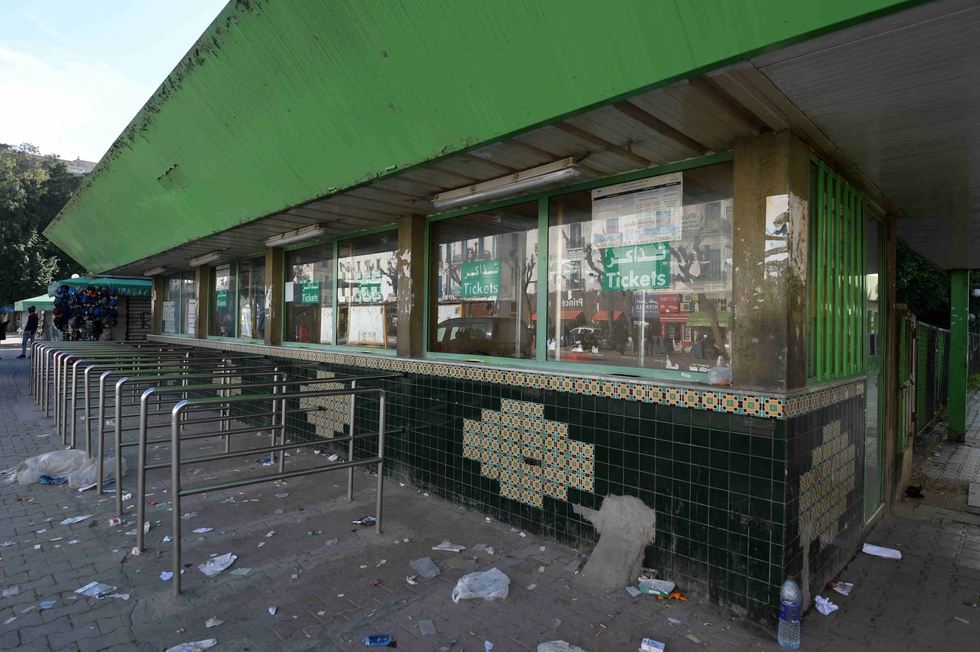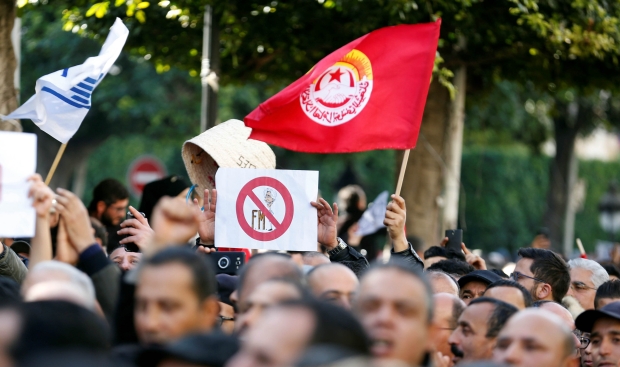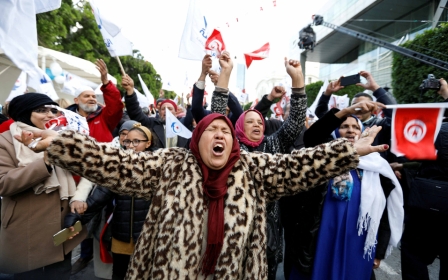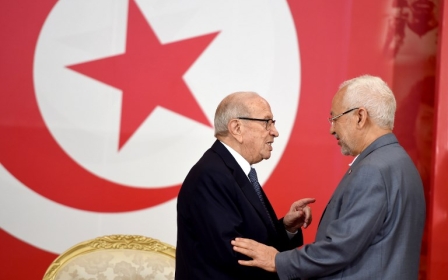Hundreds of thousands strike in Tunisia over public sector pay freeze

TUNIS - Important sectors in Tunisia ground to a halt on Thursday as the country’s largest trade union held a one-day strike in protest at the government’s failure to raise public sector workers’ salaries.
The labour action has affected Tunisia’s schools, hospitals, governmental departments, transport systems and official media, and is the fourth public sector strike since the 2011 revolution.
Flights from Tunis Carthage airport were suspended, with the terminals devoid of staff.
Hundreds of thousands of Tunisians took part, and were present at their workplaces before a mass walkout at 10am local time, after which they headed to the Tunisian General Labour Union's (UGTT) headquarters or local offices.
The UGTT is demanding the government raises the salaries of 677,000 public sector workers. The government currently spends $187m annually on public sector salaries. The UGTT wants that raised to around $800m.
The strike was successful, in terms of the number of people who joined and the turnout of protesters at the UGTT’s headquarters, which is unprecedented historically
- Nizar Ben Saleh, UGTT’s head of research
Nizar Ben Saleh, the UGTT’s head of research, said the strike had been a historic success.
“The strike was successful, in terms of the number of people who joined and the turnout of protesters at the UGTT’s headquarters, which is unprecedented historically,” he told Middle East Eye.
“Our path will continue, and we are open for serious negotiations.”
Thursday’s strike comes after days of fraught and eventually unsuccessful negotiations between the UGTT and the government, with the former accusing the latter of a lack of transparency and supplying inaccurate figures.
“In July we asked for accurate numbers from the government. We asked for the number of public servants in every category, the total salary for every category and the average salary in every category, which is a document that we use in our negotiations and enables us to quantify and assess any proposal,” Abdel Karim Jrad, a UGTT assistant secretary general, told Middle East Eye.
The government’s response, Jrad said, was that it could not provide such information.
Tunisia is suffering under an economic crisis, with living standards in the country plummeting since the 2011 revolution that toppled longtime autocrat Zine el-Abadine Ben Ali. In tandem, the cost of living and unemployment have risen sharply.
However, a senior government official, who spoke on the condition of anonymity, insisted to MEE that its reluctance to raise salaries was not directed by the IMF.
Strikers have not been buying this line, with chants of “down with the IMF government” a common refrain.
Not meeting expectations
In the run-up to the strike, the government proposed multiple solutions that did not meet the union’s expectations.
The latest, an increase of up to 180 dinars ($61) per month, to be financed through tax credits has been widely criticised.
Commentators have noted that such an increase would not positively impact the purchasing power of civil servants as it would be heavily taxed or would not be added to the retirement pension.
MPs supporting Prime Minister Youssef Chahed have struggled to dispute this, especially with the government failing to provide adequate information to the public about how it would be financed and balanced.
President Beji Caid Essebsi has called on the government to try and limit the strike in any possible. In a rare display of obedience, given the continuous tension between Essebsi and Chahed, the government seemed to follow his request.
On Wednesday evening, the eve of the strike, the government published a new decree forcing certain public sector workers to break the picket.
Under the decree, any employees deemed necessary to keep vital institutions operating that are listed can face severe penalties for failing to do their jobs, even prison time.
The general strike is expected to influence other ongoing union campaigns, particularly with secondary school teachers, whose syndicate is threatening to boycott final exams, raising tensions among parents, teachers, students, and the government.
Despite having demands more specific to the sector that are not limited to increases in wages, Lassad Yacoubi, the secretary general of the federation, told MEE he believes that the general strike will only reinforce the teachers’ demands.
Stay informed with MEE's newsletters
Sign up to get the latest alerts, insights and analysis, starting with Turkey Unpacked
Middle East Eye delivers independent and unrivalled coverage and analysis of the Middle East, North Africa and beyond. To learn more about republishing this content and the associated fees, please fill out this form. More about MEE can be found here.





